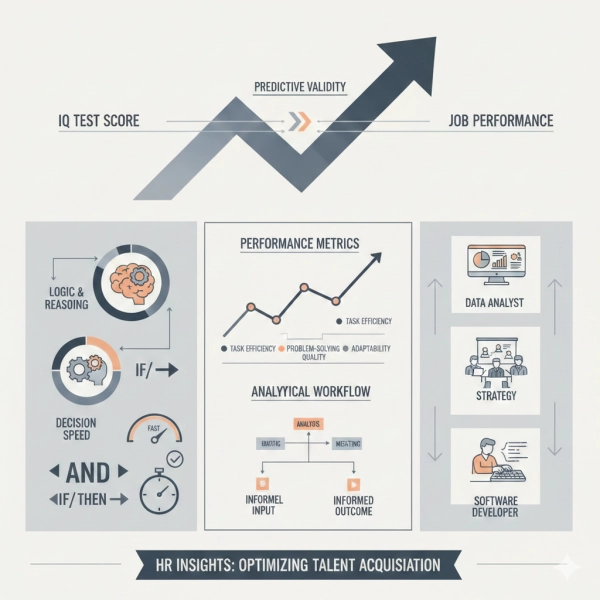In a world increasingly focused on soft skills and emotional intelligence, Singapore remains one of the few advanced economies where IQ testing still plays a strategic role in hiring decisions—especially in sectors driven by precision, data, and logic. For candidates unfamiliar with this system, understanding how IQ works in hiring provides important context.
From global banks to local tech unicorns, Singaporean companies are blending traditional interviews with cognitive assessments to spot top talent. But why?

Why Do Employers in Singapore Value IQ?
Singapore’s corporate environment is shaped by three defining pillars: performance, meritocracy, and analytical excellence. As one of the world’s most competitive business hubs—home to global financial institutions, tech giants, and fast-scaling startups—Singapore places a high premium on professionals who can adapt, think critically, and process information with speed and accuracy.
While IQ is never the sole measure of a candidate’s potential, many employers view IQ-linked assessments as a valuable tool within the hiring process. This aligns closely with global trends, as highlighted in IQ vs. soft skills in hiring and similar research-backed discussions.
This is especially true in industries where cognitive load is high and decisions must be made quickly.

1. Identifying Fast Learners in Rapidly Evolving Roles
Singapore’s economy moves fast—AI adoption, digital transformation, fintech innovation, and cybersecurity demands are reshaping job scopes constantly. Employers need individuals who can:
- Acquire new skills quickly
- Understand complex systems with minimal guidance
- Adapt to changing workflows and technologies
IQ-style reasoning tests help employers spot “high-speed learners” who remain competitive even as industries evolve. In some hiring funnels, employers rely on recruitment IQ tests to assess learning agility efficiently.
2. Predicting Long-Term Performance Under Cognitive Strain
In fields like finance, engineering, software development, consulting, and data science, employees often handle:
- Multi-layered problems
- High data density
- Rapid decision cycles
- Tight deadlines and analytical pressure
IQ-aligned assessments act as early indicators of whether a candidate can handle sustained mental intensity—similar to how cognitive stamina relates to IQ in high-performance environments.
3. Reducing Hiring Bias Through Standardised Measures
Singapore strongly advocates fairness and meritocracy in recruitment. IQ-based tests contribute to this by offering:
- A standardized, objective measure of problem-solving ability
- Reduced reliance on subjective impressions from interviews
- A fairer comparison between candidates from different educational systems, countries, or backgrounds
This helps employers make decisions based on demonstrated cognitive ability, not just resume polish or personal confidence during interviews.
4. Serving as a Baseline Indicator of Mental Agility
While employers still evaluate soft skills, domain knowledge, and cultural fit, IQ-style assessments provide a baseline snapshot of:
- Logical reasoning
- Pattern recognition
- Analytical sharpness
- Processing speed
- Cognitive adaptability
These abilities are closely aligned with traits discussed in what different IQ levels mean in real-world performance and are especially relevant in data-heavy sectors.
Industries Where IQ Testing Is Common in Singapore
While not universal, IQ-based tests are frequently used in:
| Industry | Role Examples | Why IQ Matters |
| Finance & Banking | Quant analysts, traders, risk officers | Requires quick numerical reasoning and data modeling |
| Technology | Software engineers, product analysts | Needs logic, abstract thinking, and debugging skills |
| Consulting | Strategy consultants, data analysts | Demands problem-solving under time pressure |
| Government / GLCs | Scholarship selection, talent pipelines | Seeks long-term cognitive potential |
These assessments help filter candidates beyond GPA or resume keywords, surfacing those with exceptional mental flexibility—especially in scholarship evaluations similar to high-range IQ benchmarks.
How These IQ Tests Are Administered in Singapore
Companies in Singapore typically use customized reasoning assessments rather than formal IQ tests. These are designed to reflect real-world problem-solving situations.
1. Numerical Pattern Recognition
Mirrors tasks in finance and analytics, similar to number-sequence questions featured in Singapore-style IQ practice tests.
2. Abstract Visual Reasoning
Visual matrices, rotations, and diagrammatic logic—skills also tested in culture-fair intelligence assessments.
3. Verbal Analogies and Logical Statements
Employers assess a candidate’s ability to understand arguments, evaluate language-based logic, and interpret complex instructions.
4. Time-Limited Situational Problem-Solving
Tests ability to reason under pressure, a core aspect discussed in why employers still trust IQ tests in 2025.
How Employers Use the Results
IQ-style scores are not used alone. Instead, they are combined with:
- Interview evaluations
- CV and academic performance
- Case studies or work samples
- Personality or behavioral assessments
- Cultural and team-fit criteria
This multi-layered approach gives a clearer picture of the candidate’s overall potential.
IQ vs. Other Metrics in Hiring
| Metric | Measures | Used For |
| IQ | Raw cognitive potential | Learning speed, problem-solving |
| EQ | Emotional intelligence | Teamwork, leadership, adaptability |
| GPA | Academic performance | Knowledge, consistency |
| Interviews | Communication & cultural fit | Real-world interaction |
In Singapore, IQ complements—not replaces—other metrics, especially for roles where thinking speed and logic directly impact results.
Is This Practice Ethical or Biased?
Critics argue IQ tests risk favoring certain cultural or educational backgrounds. However, Singapore employers often use “culture-fair” IQ tests, minimizing verbal or culturally loaded questions, focusing instead on:
- Visual logic
- Time-constrained problem solving
- Non-language-specific reasoning
Resources such as verbal vs. non-verbal IQ testing can help applicants understand the differences.
This levels the playing field in multinational hiring environments.

Conclusion: IQ Testing—Still Relevant in Singapore Hiring
While the West increasingly shifts toward holistic evaluations, Singapore’s pragmatic, performance-driven work culture still values raw cognitive benchmarking. IQ tests aren’t perfect, but when blended with EQ, experience, and skill assessments, they remain a powerful indicator of professional potential.
If you’re applying for roles in Singapore—especially in finance, tech, or consulting—prepare for an IQ or logic assessment. You can begin with a Singapore-style IQ simulation to understand what employers evaluate and improve your readiness.

Comments
Share Your Thoughts